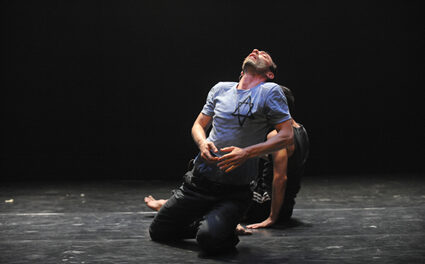Under the auspices and sponsorship of Duke Performances, the Ciompi Quartet returned to Reynolds Theatre, on Duke’s West Campus, for its latest program, the third of four on its current-year subscription series. The venerable Duke-based ensemble was established in 1965 by violinist Giorgio Ciompi; for more than a few music lovers, this is the region’s most important performing group, bar none. Its current members are Eric Pritchard and Hsiao-mei Ku, violins, Jonathan Bagg, viola, and Fred Raimi, cello. Reynolds is one of our better concert rooms, although parking and access to it are annoying challenges to many patrons. (It’s not just Reynolds, of course – this is a problem for all of Duke’s West Campus.)
On this occasion, there were gasps when the foursome took the stage, for Ku, the second violinist, hobbled in on crutches and, when she was seated, propped her left leg up on a nearby chair. She’d had a too-close encounter with a set of steps on her way to the music building but, mercifully, her injured ankle did not seem to interfere with her playing, and of course she can keep time by tapping on the other side, if she needs to.
The program began with one of Mozart’s darker works for small ensemble, the String Quartet in D minor, K.173. He was all of 17 when he wrote it; let’s hear it for creeping maturity. The Ciompis played it wonderfully, with lots of passion and drama and plenty of incisiveness and expression. (The program note, by Raimi, shed fascinating light on the work itself and its genesis.)
Next up on the relatively short first half was Janácek’s String Quartet No. 1. It’s subtitled “The Kreutzer Sonata,” which is a work for violin and piano by Beethoven, but Janácek’s composition is based, loosely, on the novella of that name by Tolstoy. Several years ago, composer J. Mark Scearce, head of the Music Department at NC State University, expanded the score with additional music for use as a ballet. The original music also exists in at least one adaptation for piano trio that will be performed in Raleigh on March 29 by the Weilerstein Trio (see our chamber music tab for details). Thus “The Kreutzer Sonata” grew from a duo for keyboard and fiddle to a quartet to an enlarged score about twice its original length – and to a re-reduction for three instruments. As the old country boy said, “Lord, bless us and bind us!”
The Janácek is a wonderfully knotty work, thought to be laden with all manner of personal hints and allusions by the composer. The quartet realized it splendidly, giving it a reading that glowed from within and reflected the ensemble’s long association with the music and their commitment to it. (The notes were, again, by Raimi.)
The concert ended with a performance of Schubert’s celebrated Octet, D.803, for strings and winds. Joining the Ciompi Quartet were Arturo Ciompi, clarinet, Michael Burns, bassoon, Andrew M. McAfee, horn, and Robbie Link, bass. Long-time followers of music in the Triangle will recognize immediately the stellar nature of this ensemble. Arturo Ciompi, whose given name celebrates Toscanini, and whose surname reminds us that he is the artistic son of Giorgio, who founded Duke’s quartet, plays too little now, but he’s a product of the [U]NC School of the Arts and a seasoned veteran of the New York musical world, and hearing him at work is always a special treat. It was wonderful, too, to encounter again bassoon virtuoso Michael Burns, currently gracing UNCG’s faculty, who was heard last summer, at the NC Museum of Art. Hornist Andrew M. McAfee was for 15 years the NC Symphony’s principal; when he relinquished that post to take up conducting, we cautioned him that there are tons of stick-wavers but too few great French horn players, of which he was (and is) indisputably one. And bassist Robbie Link, perhaps our region’s most versatile instrumentalist, turns up everywhere, it seems, in many diverse performing roles, ranging from bass to violone to backing up ethnic bands. Here, done up in a white tie and looking more than usually sedate, he was his typical and masterful classical self, and we were all enriched by the results.
Schubert’s big work – the composer could tarry long over a tune, ‘tis said – lasts about an hour. It’s in six movements, and it’s modeled on Beethoven’s much more circumspect Septet, Op. 20. (Arturo Ciompi’s program note shed lots of light on this and on his – Arturo’s – informed view of the work.) Perhaps it was the day – Valentine’s Day – or perhaps the work is simply no longer to everyone’s taste, but for whatever reason, people started trickling out of the hall about 15 minutes into the score. That’s a great shame, for this is a work that rewards patience and close attention like few others, and the artists gave a virtually flawless account of it. Yes, there were a few places where the air supply was less than needed for a phrase or two, and other places where string intonation and/or tone color were briefly suspect, but who’s to quibble about such things across 62 minutes of some of the most engaging music ever set to paper, and with multiple opportunities for all these splendid players to show their solo and ensemble skills, again and again? At the end, the crowd rose to its feet, and the applause – and cheers – lasted many minutes. There was, naturally enough, no encore!
The Ciompi Quartet’s final concerts of the season will be presented on April 9 and 11. See that aforementioned Triangle Chamber Music page or our calendar, closer to those dates, for details.











